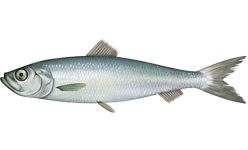reņģe
Appearance
Latvian
[edit]

Etymology
[edit]Apparently borrowed from Old Frisian hareng (“herring”) (itself maybe from here (“swarm, school of fish”), i.e. originally “school of fish” > “fish that swims in schools”), with loss of the initial syllable (*hareng > *renge > reņģe). This loanword is already found in 16th-century family names, and later in 17th-century dictionaries.[1]
Pronunciation
[edit]Noun
[edit]reņģe f (5th declension)
- herring (many fish species of the family Clupeidae, especially Clupea harengus membras, which is about 25 cm long, with a bluish green back and silvery sides)
- žāvēta reņģe — dried, smoked herring
- reņģes tomātu mērcē ― herrings in tomato sauce
- veikalā viņš bija ieraudzījis un nopircis svaigas reņģes ― in the store he had found and bought fresh herring
Declension
[edit]Declension of reņģe (5th declension)
See also
[edit]References
[edit]- ^ Karulis, Konstantīns (1992) “reņģe”, in Latviešu Etimoloģijas Vārdnīca[1] (in Latvian), Rīga: AVOTS, →ISBN
Categories:
- Latvian etymologies from LEV
- Latvian terms borrowed from Old Frisian
- Latvian terms derived from Old Frisian
- Latvian terms with IPA pronunciation
- Latvian words with level intonation
- Latvian lemmas
- Latvian nouns
- Latvian feminine nouns
- Latvian terms with usage examples
- Latvian fifth declension nouns
- Latvian noun forms
- Latvian non-alternating fifth declension nouns
- lv:Fish
